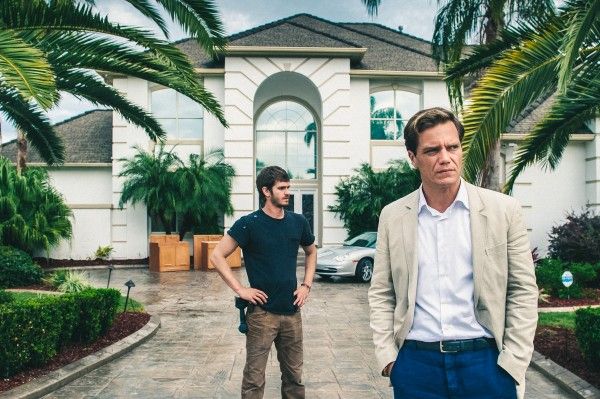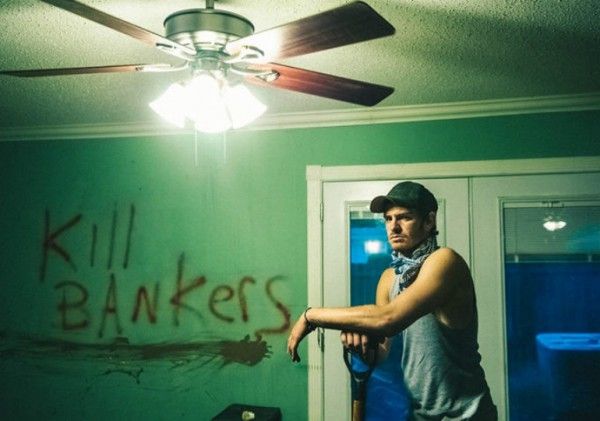In my experience, home ownership is viewed as a right of passage in America. We’ve heard of “the lawn with the white picket fence”, but no one celebrates living in the three-room apartment. Our homes aren’t just where we keep our stuff or rest our heads. They are part of our identity and more importantly, our family’s identity. In the wake of the 2008 economic crash, that identity was ripped away as millions of homes were put into foreclosure. In a country where we don’t build anything anymore, and instead just move things around, Ramin Bahrani’s 99 Homes is a heart-wrenching look at the foreclosure crisis, and with the help of incredible performances from Andrew Garfield and Michael Shannon, depicts how vultures are feasting in 21st century America.
Dennis Nash (Garfield) is a builder who can’t find work, and now the bank is foreclosing on his house with real estate mogul Rick Carver (Michael Shannon) there to snap up the property. After Dennis is forcible evicted along with his mother Lynn (Laura Dern), and son Connor (Noah Lomax), he goes to confront Carver, but ends up slipping into a Faustian bargain where he’ll repair foreclosed homes and perform other tasks. In an effort to buy back his house, Dennis ends up becoming Carver’s protégé, and discovers that it’s better to be a bird of prey than a carcass.
99 Homes is filled with scenes of people losing their homes, and this makes it one of the toughest movies I’ve had to watch this year. Bahrani depicts these scenes perfectly by refusing to embellish them. There’s no music. There’s no fancy cinematography. There are only scenes that are all too real. The film opens with Carver looking into a bathroom where the owner has committed suicide, and while it accentuates Carver’s callous nature, the scene also highlights the importance of having a home and providing for one’s family.
If that outcome seems melodramatic to some viewers, Bahrani shows us foreclosure after foreclosure starting with Dennis’, and it’s absolutely gut-wrenching. We watch Dennis and Lynn plead with Carver and the cops who have come to evict the family. The Nashes say they have 30 days to appeal a judge’s ruling. They plead for just one more day. The cop replies with a statement he’s said countless times before to countless desperate families, “You’re now trespassing.” One minute you’re a homeowner, and the next minute you’re a criminal. Dennis and his family are given two minutes to collect as many belongings as they can, and this is a “courtesy”. Everything they can’t take with them will be thrown on their front lawn, and it’s open season.
This scene has happened millions of times in America. Like his previous film At Any Price, Bahrani has an abundance of sympathy for working-class Americans who are being abused by larger institutions and powerful interests. Both films also note that for someone to be successful, other people have to suffer. 99 Homes is in the same vein, but feels more refined and more immediate. The movie is painfully matter-of-fact, and every plea from a defenseless family cuts like a dagger. These people thought they had rights. 99 Homes shows they were misinformed.
The rights belong to Carver and his ilk, and although his character is a bit heavy handed, we need someone to be a target for our anger, and no one absorbs hatred like Michael Shannon. The actor brings such overpowering conviction to the role that it’s difficult to hate him even though he blames everyone else—homeowners, banks, and the government—for his actions. “America was built by bailing out winners,” Carver tells Dennis. “There’s no room for emotion in real estate,” he says, which is easy to say when it’s not your home. Carver is so cold, calculating, and heartless that even his cigarette is mechanical.
Garfield provides the film’s aching center, and it’s wonderful to see him in a role that makes full use of his talent. He’s one of the best aspects of the Amazing Spider-Man movies, but 99 Homes is reminder that he can do so much more than carry a weak superhero franchise. Garfield disappears into the role, and everything the character does is absolutely convincing. We believe him as the rage-fueled father trying to keep his home just as much as we believe him when he becomes accustomed to Carver’s methods. It’s okay for Carver to be larger than life, but Dennis needs to be real and stand in for the millions of American who might wonder, “If I could save my house, would I be willing to evict other families from theirs?”
Bahrani explains all of this so powerfully and simply that it’s deeply disappointing when the final ten minutes verge into melodrama. In an attempt at creating catharsis, the movie hits a false note that is completely out of tune with the unflinching honesty that came before. It’s a moment we’d like to see, but to this point 99 Homes isn’t about showing us what we’d like, but showing us what we (and I’m using “we” as people who people who still have homes) try to ignore.
99 Homes takes place in 2010 when homes were being foreclosed on at an alarming rate. Bahrani’s film should tear you up inside and make you ache with its claustrophobic, unflinching depiction of families losing everything while others shrug and say, “Well, if there are going to be losers, someone has to win. May as well be me.” As 99 Homes shows, losing human decency is only slightly harder than losing a home.
Rating: A-
Click here for all of our TIFF 2014 coverage. Click on the links below for our other TIFF 2014 reviews:
- Backcountry
- Cub
- The Drop
- The Editor
- Electric Boogaloo
- Face of an Angel
- Force Majeure
- Foxcatcher
- Good Kill
- Haemoo
- The Humbling
- The Imitation Game
- It Follows
- The Keeping Room
- The Look of Silence
- Love & Mercy
- Manglehorn
- Men, Women & Children
- Mr. Turner
- Nightcrawler
- Pawn Sacrifice
- Pasolini
- The Reach
- Red Army
- The Riot Club
- Rosewater
- Tales of the Grim Sleeper
- The Last 5 Years
- The Tale of Princess Kaguya
- This Is Where I Leave You
- The Wanted 18
- Top Five
- Welcome to Me
- What We Do in the Shadows
- While We’re Young
- Whiplash
- Wild



